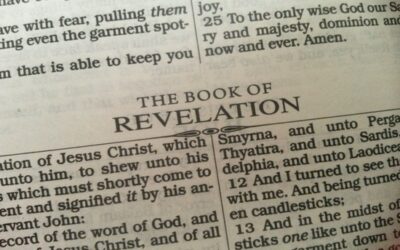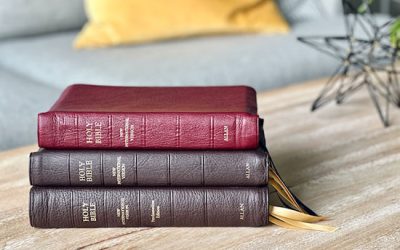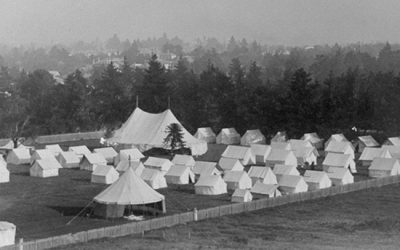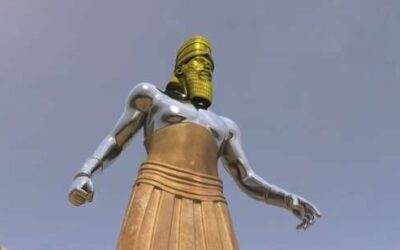Times of crisis call for men and women of action. The Israelites, newly settled in the Promised Land, found themselves in those times. As enemy nations attacked and oppressed the tribes, they cried out to God for help. He, in turn, sent them men and women of action—known as judges.
The book of Judges in the Old Testament tells the stories of these judges. The accounts, though, are not happy bedtime stories. Instead, they show the darker sides of human nature and the corruption taking place in ancient Israel at the time.
But they still teach us important lessons and reveal the patient and merciful character of God.
Let’s uncover those lessons as we answer the following questions:
- What was a judge in the Old Testament?
- Why is an entire book of the Bible devoted to the judges?
- Who are the 12 judges of Israel?
- How did God use the judges?
What was a judge in the Old Testament?
Today, we think of judges as individuals in court who handle cases and administer sentences. But in the book of Judges in the Bible, they were people God raised up to govern the Israelite tribes and when the situation called, lead them into battle against hostile nations (Judges 2:16–18). Their duties had to do more with military matters than judicial ones.
The Hebrew word for “judges” in the Old Testament is shophet. It means “bringer of justice.”1
Interestingly, Judges 11:27 refers to God Himself as shophet. He is the ultimate Judge. The judges He appointed were simply tasked with bringing His justice to other nations.
Where did this role come from?
The concept of a judge originated with Moses, who handled disputes between the people (Exodus 18:13). When the task became too great for one person, he delegated authority to judges over smaller groups of people within Israel (verses 25–26). These judges were like regional officers that dealt with minor matters related to the law (Deuteronomy 16:18; 17:9).
In the book of Judges, though, God chose special judges whose purpose was to overcome Israel’s enemies.
How was a judge different from a king?

Photo by Mike B
Though the judges had some administrative authority, they were different from kings because their position was not hereditary, like a monarchy. They didn’t get to choose who came after them, either.2
Judges also didn’t have the same privileges as kings. Rather, they were often common men with ordinary lives. Kings could demand servants, land, and wealth (1 Samuel 8:10–18), but the judges didn’t receive economic benefits from their roles.
How was a judge different from a prophet?
Prophets in the Bible received messages from God to give to the people (2 Chronicles 36:15; Amos 3:7). This gave them religious authority, but not civil or military authority. Compared to prophets, the judges had a much more active role in the military affairs of Israel.
However, on some occasions, God appointed individuals to hold both roles. Two examples are Deborah (Judges 4:4) and Samuel (1 Samuel 3:20).
How did God choose the judges?
We don’t know much about how God chose most of the judges. Aside from the angel of the Lord appearing to both Gideon and the parents of Samson (Judges 6:11; 13:1–5), we only know that God “raised” up deliverers or they “arose.”3 But looking at the majority of the judges’ stories, there are some similarities in the qualities God was looking for:
- Humility
- A willingness to submit to His Spirit’s leading
Instead of choosing people that were popular and confident, God used people who distrusted themselves and weren’t afraid to lean on Him.
For example, Gideon felt small for the task God had given him (Judges 6:15). And Jephthah was the son of a prostitute and a social outcast (Judges 11:1–3).

Photo by Emiliano Orduña on Unsplash
But it was this humility that allowed God to work His miracles. The judges were willing to submit to His Spirit, without letting their egos get in the way.4
And when God’s Spirit is at work, the victory comes from Him instead of human strength (Zechariah 4:6).
In the case of Gideon, God asked him to step out in faith by preparing an army and following His instructions. As Gideon cooperated with God, his small army overcame the Midianites (Judges 7).
In other cases, God appointed people with skills related to their calling. In fact, Othniel had conquered a city occupied by giants (Joshua 15:13–17), and Jephthah was a mighty warrior (Judges 6:12; 11:1).
Nevertheless, God values a willing and surrendered heart above all else. He needed judges who would look to Him and use their strengths for His glory.
Why were the judges needed?
The judges in the Old Testament came on the scene after the deaths of Moses and Joshua— a time when the Israelite people became rebellious, neglecting God’s covenant and becoming enamored with other gods (Judges 2:7–13). Without God’s blessing and guidance, they compromised many of their values. This made them vulnerable to be conquered by the surrounding nations.
As they cried out to God for help, He appointed deliverers—judges—for them. These judges provided leadership, organization, and military order (Judges 2:16–18).
What was the covenant that the Israelites had broken?
God had promised them that if they remained faithful to Him and drove out the Canaanite nations, He would bless them with victory (Deuteronomy 11:22–25).
But if Israel failed to do so and began to mingle with the Canaanites, adopting their corrupt, self-serving beliefs and practices, then those Canaanite nations would overcome them (Joshua 2:11–13).
Sadly, the latter scenario occurred in a cycle:
- The Israelites turned from God.
- Enemy nations came and conquered them.
- The Israelites cried out to God for help.
- God sent them a judge to deliver them.
Unfortunately, once victorious, the Israelites again fell into corruption and sin, and the cycle repeated itself.
These stories sure tell us a lot about our fickle human nature.
Why is an entire book of the Bible devoted to the judges of Israel?
Here are several reasons:
1. It provides a historical record

Photo by Luis Quintero
The book of Judges shows us what happened to God’s people after they settled in the Promised Land of Canaan. This record stretches from the death of Joshua to the time of Samuel.
2. It shows us the results of disobeying God
Many times, the book of Judges mentions how “everyone did what was right in his own eyes” (Judges 21:25, ESV). Without God’s instructions as their standard, it became all too easy to chase after their own selfish whims. Corruption became rampant, and even civil war broke out among the Israelite tribes (Judges 9, 20).
3. It gives us the backdrop to the Israelites’ demand for a king
When the people turned from God as their ruler, chaos resulted. Thus, they thought that having a king would solve their problems.
But that wasn’t the real solution. Leaving their selfish ways behind and coming back to God was.
Unfortunately, the Israelite people didn’t fully understand this. Instead they kept comparing themselves to the neighboring nations. So they demanded an earthly king to lead their armies and fight their enemies (1 Samuel 8:19–20).
4. It shows us God’s incredible mercy
Despite how many times His people turned from Him, God didn’t give up on His people. He heard their cries and sent them deliverers. Their suffering grieved Him and moved Him to action (Judges 10:16).
5. It demonstrates what God can do with ordinary, flawed people
The judges often didn’t have special qualifications or skills—most of them were simply willing to follow God’s plan.
Sometimes, though, they allowed pride and selfishness to get in the way so that God could not fully work through them.
And even then, God still used them as much as He could.
Who are the 12 judges of Israel?
The book of Judges mentions 12 individuals who delivered the Israelites from their enemies. They are divided into major and minor judges by how much the Bible says about them. The major judges are Othniel, Ehud, Deborah, Gideon, Jephthah, and Samson. The minor judges are Shamgar, Tola, Jair, Ibzan, Elon, and Abdon.
These judges lived within a period of about 350 years.5
Some of them overlap with one another because they were in different regions, fighting different enemies.6 Thus, they didn’t follow each other in a sequence, as it might appear from a quick glance at the book.
But we’ll learn about them in the order that the Bible lists them.
1. Othniel (Judges 3:9–11)
After the Israelites had been in bondage to a king of Mesopotamia for eight years, they cried out to God who appointed a leader named Othniel.
Othniel was from the tribe of Judah. His name, which means “lion of God,”7 is fitting since he had conquered a Canaanite city that was occupied by giant people (Joshua 15:13–17; Judges 1:12–13).
2. Ehud (Judges 3:15–30)

Photo by Anis Rahman on Unsplash
God raised up Ehud of the tribe of Benjamin to deliver the Israelites from Moabite oppression. He carried out a secret assassination of King Eglon of Moab and then rallied the Israelites to spring a surprise attack on the Moabites.
The Bible mentions something unique about Ehud:
He was left-handed.
And Ehud used that to his advantage on his secret mission. He hid a dagger under his clothes on his right side so that he would be able to pull it out with his left hand. Apparently, the court guards didn’t think to check there!
Thus, Ehud’s assassination attempt was successful, and Israel was victorious…
…at least for a time.
3. Shamgar (Judges 3:31)
Shamgar gets one verse of recognition in the Old Testament for delivering Israel from the Philistines. His feat? He killed 600 men with a cattle prod—a long stick with a pointed end that was used for cattle herding.
Shamgar’s tribe is not mentioned. But some scholars believe that he may have been a non-Israelite since his name is not Hebrew.8 This reminds us that God can use anyone who is faithful to Him.
4. Deborah (Judges 4–5)
Deborah of the tribe of Ephraim gets the credit for being the only female judge, as well as one of the few female prophets (Judges 4:4). She supported Barak of Naphtali in leading an army to defeat the Canaanite king Jabin and his commander Sisera.
Deborah is also the only one in the book of Judges that seems to be performing a truly judicial role. Judges 4:5 says,
“She used to sit under the palm of Deborah…and the people of Israel came up to her for judgment” (ESV).
Her spirituality and wisdom earned her the title “mother in Israel” (Judges 5:7, NKJV) and brought peace to the nation for 40 years.
5. Gideon (Judges 6:11–8:28)

Photo by Aziz Acharki on Unsplash
God appointed Gideon of Manasseh to deliver the Israelites from Midianite oppression. God helped Him do so with only 300 men, who entered the enemy camp in the middle of the night, blew their trumpets, and smashed jars that contained bright torches. The whole Midianite camp fled in confusion (Judges 7:19–25).
Gideon is also known for finally destroying idols and altars to the false gods Baal and Asherah, that were set up by people in his own tribe.
6. Tola (Judges 10:1–2)
Little is said about Tola, except that he came from the tribe of Issachar. God raised him up to save Israel, and he judged the nation for 23 years.
7. Jair (Judges 10:3–5)
Jair, whose name meant “God enlightens,”9 was from the tribe of Manasseh. God appointed him to judge Israel for 22 years. His claim to fame was that he had 30 sons, who rode on 30 donkeys and had 30 cities.
8. Jephthah (Judges 11:5–12:7)
The elders in Israel summoned Jephthah—also from the tribe of Manasseh—to help them during a time when the Ammonites were oppressing the Israelites. First, Jephthah attempted diplomacy, but when that failed, he took an army against the Ammonites and God led them to gain victory over them.
9. Ibzan (Judges 12:8–10)
Ibzan of Judah judged Israel after Jephthah, though we don’t know if he made any military conquests during those seven years. He also had 30 sons, as well as 30 daughters. It’s also mentioned that each of his children married people outside of his tribe (Judges 12:9).
10. Elon (Judges 12:11–12)
Elon’s name means “oak” tree and may have indicated his strength.10 He was from the tribe of Zebulun and judged Israel for ten years.
11. Abdon (Judges 12:13–15)
Abdon, from the tribe of Ephraim, judged Israel for eight years. Like Ibzan and Jair, he had a large family—40 sons and 30 grandsons—and he might have been quite wealthy since they rode on 70 donkeys.
12. Samson (Judges 13–16)

Photo by Christina Rumpf on Unsplash
Samson, of the tribe of Dan, was called from birth to deliver Israel from the Philistines (Judges 13:2–24). As a part of his calling, God blessed him with unusual strength.
The secret of his strength?
His vow of dedication to God, symbolized by his long hair. Some of his feats included:
- Tearing a lion to pieces (Judges 14:6)
- Killing 1,000 Philistines with a donkey’s jawbone (Judges 14:15)
- Carrying the gates of a city up a hill (Judges 16:3)
- Pushing down the main pillars of the Philistines’ temple of Dagon, killing 3,000 Philistines and himself
Other judges
Israel had a few more judges, who are mentioned in other books of the Bible. Moses (Exodus 18:13, 16) was the first judge. The rest, who emerged around Samson’s time, include:
- the priest Eli (1 Samuel 1:9)
- the prophet Samuel (1 Samuel 7:15–17)
- Samuel’s sons (1 Samuel 8:1–5)
Because Samuel’s sons were so corrupt, the Israelites asked God to appoint them a king instead (1 Samuel 8:1–5). Thus, the time of the judges came to an end.
And speaking of corruption, Samuel’s sons were not the only ones who struggled. Many of the judges had major flaws. It’s a wonder that God was able to use them!
How did God use the judges despite their faults?
It only takes a glance at the judges’ lives to realize that many of them were pretty messed up. Their poor choices no doubt affected their success. But God still used them. He placed His Spirit upon them and worked with them where they were at.
Here are some examples:
- Gideon was a coward. God knew this struggle and answered his request for signs to confirm his calling (Judges 6:17-21), which includes the well-known story of “putting out the fleece” (Judges 6:36-40). As Gideon’s faith grew, God tested him while continuing to assure him (Judges 7:9-14).
- Jephthah made a rash vow, promising that if God gave him victory, he would sacrifice whatever came out his door to meet him. The vow was completely unnecessary because God had already promised him victory in the war (Judges 11:24, 27). By his vow, Jephthah showed that he didn’t understand God’s character. He viewed God more like the Canaanites viewed their gods—as a deity that needed to be appeased. Nevertheless, God gave Jephthah military success.
- Samson was impulsive and promiscuous (Judges 14:1–3). But God even used his flaws to bring judgments on the Philistines. God was patient with Samson and didn’t take away his strength until Samson allowed his hair—the symbol of his commitment to God—to be cut. At the end of his life, when Samson humbled himself, God strengthened him one last time. Then he sacrificed himself to take out the “lords of the Philistines” by collapsing an entire house on all of them (Judges 16:27-30).
Please note:
This doesn’t mean that God endorsed wrong behavior. Rather, God worked with what was available to Him.
And here’s the lesson for us:
No matter who we have been, God wants to use us if we’re willing to be led by Him.
That’s why these stories are here. When we feel like failures, these stories give us the courage to keep moving forward in following Jesus.

Photo by Gift Habeshaw on Unsplash
If God could use the judges, He can use you
The Old Testament stories of the judges take a deep dive into the tragedy and violence that result when people turn from God. It’s tempting to skip over these stories for something more positive elsewhere in the Bible, but remember:
The book of Judges is important for us.
Like the Israelites, we live in a world that needs God. And through the stories of the judges, we find principles that help us navigate the challenges we face today.
We can see the consequences of ignoring God’s will. We can learn from the mistakes of the judges. And most importantly, we can get a glimpse of God’s incredible mercy that uses us despite our faults.
Want to learn more about how the Bible stories apply to your life?
- Constable, Thomas, “Judges,” Dr. Constable’s Expository Notes. [↵]
- Easton, Matthew George, ed., ”Judge,” Easton’s Bible Dictionary, 3rd ed., 1897. [↵]
- Judges 2:16, 18; 3:9, 15; 5:7; 10:1, 3 [↵]
- Judges 3:10; 6:34; 11:29; 13:25; 14:6, 19; 15:14 [↵]
- Swindoll, Chuck, “Judges,” Insight for Living Ministries, insight.org. [↵]
- Ibid. [↵]
- Gesenius, Wilhelm, and Samuel P. Tregelles, “Othniel,” Gesenius’ Hebrew and Chaldee Lexicon to the Old Testament Scriptures (Grand Rapids: Eerdmans, 1957). [↵]
- “Shamgar,” Holman Bible Dictionary. [↵]
- “Jair,” Gesenius’ Hebrew and Chaldee Lexicon to the Old Testament Scriptures. [↵]
- “Elon,” Gesenius’ Hebrew and Chaldee Lexicon to the Old Testament Scriptures. [↵]
More Answers
The Ten Commandments from a Seventh-day Adventist Perspective
Ever eaten a salad and gotten a big piece of green stuck in your teeth? And you didn’t realize it was there until you looked in the mirror? (Because no one ever told you!)
Major Fulfilled Bible Prophecies You Should Know About
Prophets seem like something from novels or movies. The predictions they make couldn’t actually happen, could they? After all, nobody can tell the future!
Why Do Some Bibles Have More Books Than Others?
Christians consider the Bible as their sacred writings. But within Christianity, different denominations use Bibles with different numbers of books.
The Benefits of A Seventh-day Adventist Academy
Adventist academies are high schools (grades 9-12) that are owned and operated by the Seventh-day Adventist Church.
Are Seventh-day Adventists Christians?
Yes, the Seventh-day Adventist Church is a Protestant Christian denomination formed in 1863. Just like other Christians, we believe that Jesus Christ is our Savior and seek to follow the principles of the Word of God.
Adventist Movies: Where Faith and Film Meet
The Adventist Church uses film to share our faith and uplift positive values. Learn more about specific Adventist-produced films and where to find them.
Does the Bible Teach Predestination?
your choices, actions, and habits really matter to your eternal destiny? Or is the path you choose in life predetermined, and your life is just following a script that’s been laid out for you?
The Seven Churches of Revelation and What They Mean
The seven churches were churches that received messages from Jesus Christ through the apostle John while he was exiled on the island of Patmos. These letters are in chapters 2 and 3 of Revelation.
Do Adventists Celebrate Christmas?
In general, most Seventh-day Adventists do celebrate Christmas.
Since our denomination doesn’t have specific guidelines about holidays, it’s up to each member to decide whether to celebrate it based on their personal convictions and study of the Bible.
What Does the Bible Say About Modesty
Seventh-day Adventists and Christians in general try to ensure their outward presentation and lifestyle glorify God. This often involves daily habits like the ways we hold conversations, the ways we dress and accessorize, and the ways we regard other people when we’re out and about.
How Do Adventists Make Movie and Music Choices?
How do Adventists decide what music to listen to and which movies to watch? Learn how Bible principles can help us make better entertainment choices.
Does the Seventh-day Adventist Church Believe in Paying Tithe?
Seventh-day Adventists believe in paying tithe and offerings based on the biblical command and our commitment to being wise stewards of God’s resources. These donations help fund the mission of the Adventist Church by supporting pastors, missionaries, church expenses, and evangelistic projects, among other things.
What Are the Beatitudes (And What Do They Mean)?
What Are the Beatitudes (And What Do They Mean)?The Beatitudes, found at the beginning of Jesus’ Sermon on the Mount in the Gospel of Matthew, are Jesus’ kingdom manifesto. They describe the way His kingdom works and what it means to be one of His followers. Even...
What Is the Fruit of the Holy Spirit in the Bible?
When we cultivate our relationship with Jesus, the Holy Spirit gives us traits that help us in our day-to-day activities and interactions. These are the fruit of the Spirit.
Seventh-day Adventist World Population and Demographics
The Adventist Church has more than 22 million members and 100,000 churches worldwide, plus a large system of hospitals, schools, and publishing houses. Learn more about this diverse church.
Bible Translations
Bible Translations—Which Version is “Best”?The most accurate Bible possible would be one that’s printed in its original languages—Hebrew and Greek. But since most of us are not Hebrew or Greek scholars, the next best option is an English Bible translation that most...
What Is a Seventh-day Adventist Camp Meeting?
Although camp meetings didn’t begin with the Seventh-day Adventist Church, they’re as much an Adventist thing as haystacks.
Camp meeting is an extended event for Adventists (and non-Adventists) of all ages to gather and participate in spiritual seminars and activities. During the event, attendees often camp in tents, campers, or RVs.
What Is the Statue in Nebuchadnezzar’s Dream?
Ever had a dream you couldn’t remember? You know it was disturbing, but the details escape you. Ugh, the frustration!
How to Join the Seventh-day Adventist Church
Whether you heard about the Seventh-day Adventist Church through a traveling evangelist, during your online searches, or through a loved one or relative, you might be considering joining yourself.
What Are the Three Angels’ Messages in Revelation 14?
The three angels’ messages in Revelation 14 warn the world to worship God, leave religious confusion, and avoid worship of human traditions instead of God’s commands.
Is the Old Testament Important for Christians Today?
Yes, the Old Testament is important because it kicks off the story that is continued by the New Testament. Without it, we wouldn’t have the vital background to Jesus’ first coming and the other accounts of the New Testament.
The Early Christian Church [Overview]
The Early Christian Church describes the faith community that developed from followers of Jesus after He returned to heaven (Acts 1) in A.D. 31. Their purpose was to be witnesses of the life, death, and resurrection of Jesus and grow their faith community into a worldwide movement.
Individual or Group Bible Study—Which Is Better?
They’re both great, of course! But depending on where you’re at and what your goals are, it’s worth looking into the different benefits of each.
How Do Adventists Do Baby Dedications?
For Christians, dedication ceremonies for babies, also for older children, are an important time for parents and the church. It’s a special part of the worship service when parents present their young children to God and the church family. Both parents, along with the congregation, regard this as a solemn promise to be a Christ-like example to the child.
All About the 2300-Day Prophecy and the Investigative Judgment
This page will explain what the 2300-day prophecy is about. We’ll especially be looking at what events marked its fulfillment and what it has to do with the Investigative Judgment.
Do Adventists Celebrate Communion and Foot Washing?
Like many Christian denominations, Adventists regularly participate in communion, also referred to as the “Lord’s Supper” or the “Last Supper.” They also practice foot washing (John 13:1-20), or the “ordinance of humility,” during the service—which isn’t as common.
Faith and Works—Do Both Matter in the Christian Life?
In so many religions all throughout time, individuals work toward enlightenment, salvation, or the favor of a deity. People are taught subtly—or not so subtly—that if you only do enough good deeds, you’ll be worthy/ascended/redeemed/approved, etc.
What is the Concept of “Present Truth” and Why is it Important?
Present truth is the principle that certain biblical truths are relevant to God’s people at specific times in history. God sends the Holy Spirit to reveal truths that help us better understand how to interpret and apply His Word in a present moment.
Do Seventh-day Adventists Celebrate Easter
Yes, many Seventh-day Adventists do celebrate Easter.
Didn’t find your answer? Ask us!
We understand your concern of having questions but not knowing who to ask—we’ve felt it ourselves. When you’re ready to learn more about Adventists, send us a question! We know a thing or two about Adventists.






















![The Early Christian Church [Overview]](https://www.askanadventistfriend.com/wp-content/uploads/2023/01/old-temple-400x250.jpg)






